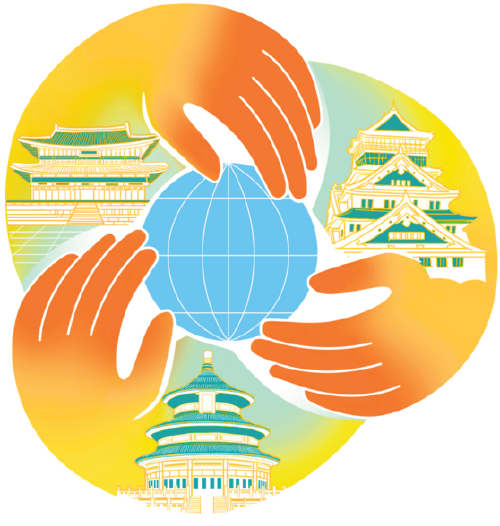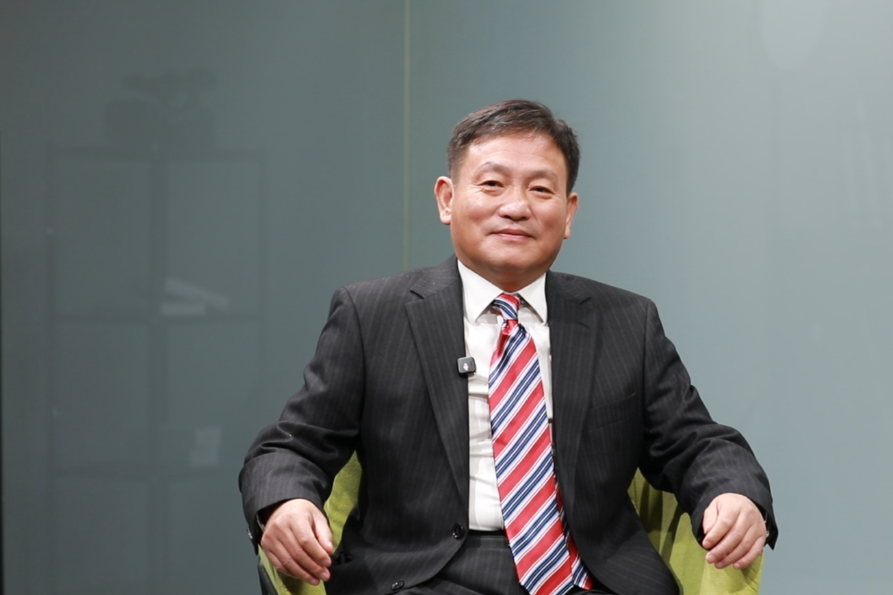A three-pronged Northeast Asia strategy


China has to compete with the US, properly handle its ties with Japan and the ROK, and strive to prevent the formation of an anti-China bloc in the region
With the United States pushing for an "Indo-Pacific" strategy, the trilateral cooperation among the US, Japan and the Republic of Korea has been significantly strengthened and become a crucial part of Washington's plan for transforming its Asia-Pacific alliance into a military one similar to NATO. This enhancement in cooperation is poised to significantly impact China's external environment.
Recently, the trilateral cooperation between Washington, Tokyo and Seoul has been moving forward, with progress made in high-level interactions, strategic coordination, security collaboration, economic cooperation, and institutional development, making their cooperation increasingly robust.
First, high-level interactions between the three sides have become more frequent. Shortly after taking office, ROK President Yoon Suk-yeol met with the leaders of the US and Japan at the NATO summit in Madrid. Subsequently, the leaders met during the East Asia Summit in Phnom Penh, the G7 Summit in Hiroshima, the G20 Summit in New Delhi, and the APEC Summit. In August 2023, the Camp David summit marked their first trilateral meeting outside of large international conferences, symbolizing a significant enhancement in US-Japan-ROK cooperation.
Second, the trilateral strategic coordination has notably increased. The US, Japan and the ROK have continuously strengthened their strategic coordination, especially in implementing the US' "Indo-Pacific "strategy, which was laid out by the White House in 2022 and highlighted the need for close cooperation among the three countries. Japan and the ROK have actively aligned with the Biden administration and adjusted their policies accordingly. In addition to the trilateral cooperation, it has become more common for the US and Japan, and the US and the ROK to develop partnerships with third-party countries, with increased cross-domain strategic coordination. Interaction between the US-ROK alliance and the NATO has also intensified, further enhancing the strategic coordination among the three countries and advancing the expansion of NATO in the Asia-Pacific region.
Third, the security cooperation among the three countries continues to deepen. The US, Japan and the ROK have intensified their security collaboration across multiple areas, increasing high-level defense interactions, conducting targeted trilateral joint military exercises and strengthening intelligence-sharing mechanisms. Vincent Brooks, the former commander of US Forces Korea, has publicly suggested that the US consider merging its forces in the ROK and Japan into a "Far East Command" to adapt to the strengthening trilateral military security cooperation.
Fourth, the economic cooperation among the three countries is gradually being strengthened. The US places high importance on enhancing cooperation with Japan and the ROK in technology research and innovation and has actively encouraged their participation in its export control framework. The three countries also engage in trilateral economic cooperation within regional or global frameworks, including establishing the "Indo-Pacific "Economic Framework for Prosperity to compete for regional economic cooperation leadership and participating in the Partnership for Global Infrastructure and Investment to counter the Belt and Road Initiative.
Stronger US-Japan-ROK cooperation will deteriorate the situation not only in Northeast Asia but also in the Asia-Pacific region and globally.
First, it intensifies bloc confrontation in Northeast Asia. As US-Japan-ROK cooperation deepens, the bloc confrontation in the region becomes more pronounced and the US-led triangle of US-Japan-ROK is increasing the risk of regional conflicts.
Second, it further weakens the momentum for integration among China, Japan and the ROK. This trilateral cooperation has stalled over the years. As US-Japan-ROK cooperation deepens, Tokyo and Seoul are gradually participating in the US-led technology and economic decoupling from China. Both countries have joined US-led initiatives such as the IPEF, the Quadrilateral Security Dialogue, commonly known as the Quad, and Minerals Security Partnership, which dealt blows to economic and trade cooperation with China and weakened the internal integration dynamics in Northeast Asia.
Third, security risks on the Korean Peninsula have also increased. Traditionally, peace and stability on the Korean Peninsula have relied on coordination among major powers and between the DPRK and the ROK. The enhancement of US-Japan-ROK cooperation greatly complicates these coordination mechanisms. The operation of major power coordination mechanisms depends on stable relations among major powers, and the strengthening of US-Japan-ROK cooperation reduces the US' readiness to coordinate with other major powers. The US increasingly relies on strengthened relations with Japan and the ROK to implement its policy toward the DPRK, rather than coordinating with China and Russia. Deteriorating relations between the DPRK and the ROK also heightens security risks on the peninsula, significantly weakening the inter-Korean coordination mechanism, deepening hostilities, and intensifying confrontations. Deeper US-Japan-ROK cooperation and their collective tough stance have led Pyongyang to perceive increased threats, prompting it to respond with tough measures.
Fourth, the Taiwan question faces mounting external intervention pressure. The primary goal of Washington in promoting trilateral cooperation with Tokyo and Seoul is to counterbalance Beijing. The US hopes that Japan and the ROK will closely follow its lead on the Taiwan question, increasing their involvement and complicating the situation. The US, Japan and the ROK have issued multiple statements concerning Taiwan, which complicates the Taiwan question and increases the risk of external intervention.
Although the US, Japan and the ROK are continuously strengthening their trilateral relationship, striving to establish strategic alliances, value alliances and quasi-military alliances, their cooperation also faces challenges, such as difficulties in achieving interoperability in security cooperation, changes in their domestic political landscape, and divergent perceptions of regional affairs, adding uncertainty to the deepening process.
For China, it is necessary to recognize that the trend of deeper US-Japan-ROK cooperation will not be altered in the short term, and also to understand that their China policies are not monolithic but show significant differences. China needs to reposition its Northeast Asia strategy under the overarching strategy of competing with the US, properly handling its relationships with Japan and the ROK and striving to prevent the formation of a stable anti-China bloc in Northeast Asia.
First, China should advance pragmatic cooperation with Japan and the ROK. Economic cooperation among the three countries remains close and serves the interests of all three parties. Enhancing pragmatic cooperation among the three countries can help constrain US-Japan-ROK cooperation to some extent. Second, it is important to strengthen security cooperation in Northeast Asia to alleviate the regional security tensions and prevent the situation on the Korean Peninsula from spiraling out of control. The intensification of US-Japan-ROK cooperation has raised security risks in Northeast Asia, making it more necessary for China, Japan and the ROK to enhance their security cooperation and communication. Third, China, Japan and the ROK should scale up cooperation on multiple levels and channels, not only maintaining communication with the governments of the other two countries but also enhancing interactions with their political and business circles as well as civil groups to improve mutual understanding and mitigate the negative impacts of US-Japan-ROK cooperation.
The author is director of the International Security Research Center at China Foreign Affairs University. The author contributed this article to China Watch, a think tank powered by China Daily.
Contact the editor at editor@chinawatch.cn.

































